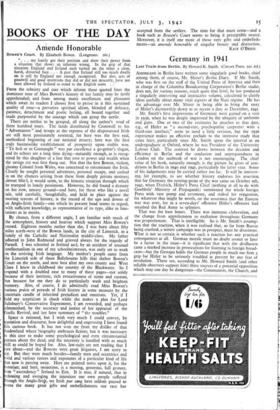BOOKS OF THE DAY
Aniende Honorable
Bowen's Court. By Elizabeth Bowen. (Longmans. 16s.) " . . my family got their position and drew their power from a situation that shows an inherent wrong. In the grip of that situation England and Ireland each turned on the other a close, harsh, distorted face. . . . A past that Ireland still too much dwells on is still by England not enough recognised. But also, acts of goodwill and good intentions that did or did not miscarry, have not been allowed by Ireland to stand to the English score .
FROM the sobriety and care which inform these quoted lines the dominant tone of Miss Bowen's history of her family may be justly apprehended; and from among many excellences and pleasures which await its readers I choose first to praise in it this sustained quality of tone—a pervasive spiritual idiom, blended of delicacy, patience, detachment and poetic feeling, all bound together and made purposeful by the courage which can grasp the nettle.
There are nettles to be grasped, all along the author's road of three hundred years. The lands distributed by Cromwell to his " Adventurers " and troops at the expense of the dispossessed Irish are still most passionately resented, for here was the first real, methodical beginning of our national misery; here was the first truly businesslike establishment of prosperity upon visible woe. "To hell or to Connaught" was par excellence a go-getter's slogan, and its echoes are a long time dying—naturally enough, as is recog- nised by this daughter of a line that rose to power and wealth when the savage cry was first flung out. Not that the first Bowen, violent, gloomy Colonel from Wales, was concerned to exterminate the Irish. Clearly he sought personal adventure, personal escape, and cashed in on the chances arising from these from deeply private motives; almost blini, it would seem, to the historic situation through which he tramped in lonely pessimism. However, he clifl found a dynasty on his new, uneasy ground—and here, for those who like a novel tale, told carefully, thoughtfully, and held in place against the moving screens of history, is the record of the ups and downs of an Anglo-Irish family—one which its present head seems to regard, with sufficient knowledge, as representative of its type, alike in limi- tations as in merits.
By chance, from a different angle, I am familiar with much of the atmosphere, history and hearsay which support Miss Bowen's record. Eighteen months earlier than she, I was born about fifty miles north-west of the Bowen lands, in the city of Limerick, in a family of the Catholic and Nationalist middle-class. My father adhered to John Redmond and grieved always for the tragedy of Parnell. I was schooled in Ireland an3, by an accident.'of unusual intellectualism in one of my schoolmistresses, was early set to work on the reviving Irish language. My mother's people came from the Limerick side of those Ballyhouras hills that shelter Bowen's Court on the north, and next best after my own county and West Clare I knew in childhood the country of the Blackwater. So I espond with a doubled ease to many of these pages—not solely because of their intrinsic, rich evocativeness of scene and custom, but because for me they do so particularly wash and brighten emory. Also, of course, I do admittedly read Miss Bowen's arious précis of periods of Irish history in some measure by the
ncertain candle of inherited prejudices and emotions. Yet, if I l old my scepticism in check while she makes a plea for Lord alisbury's Conservative Experiment, I am rewarded, and perhaps dmonished, by the accuracy and justice of her appraisal of the aelic Revival, and her later summary of "the troubles."
Space is rationed, but I wish very much I could convey, by uotation and discourse, how delightful and engrossing I have found is curious book. It has not won me from my dislike of that hadowland where biography embraces fiction; but it was necessary n this case to make some psychological and even circumstantial esses about the dead, and the necessity is handled with as much•kill as could be hoped for. Also, law-suits are not reading that I are about—and the Bowens were great litigators I am sorry to y. But they were much besides—family men and eccentrics and vid and various tasters and exponents of a particular kind of life hat now is passing away. Here are pointed notes upon it, for the storian; and here, meantime, is a moving, generous, full gesture, om " ascendancy " Ireland to Eire. It is true, if natural, that in eckoning and avenging the injustices our own people suffered hrough the Anglo-Irisk, we Irish pur sang have seldom paused to ssess the many great gifts and embellishments our race has accepted from the settlers. The time for that must come—and a book such as Bowen's Court seems to bring it perceptibly nearer. Moreover, it is itself one more of those very gifts and embellish- ments—an amende honorable of singular beauty and distinction.
ICaTE O'BRIEN.


























 Previous page
Previous page